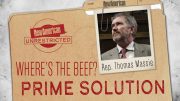
Small businesses are usually independently owned shops within a community that work to serve local people and those who travel through the area. As such, they are more connected to the residents of a specific town or city and its local culture. These shops are often run by families and people who invest not only their money, but also their time.
The Biden administration recently released a report titled “The American Jobs Plan Supports Small Businesses.” This document describes the devastation small businesses have suffered — blaming COVID-19 instead of government overreach in response to the virus — and lists various ways that the federal government will “help” these businesses through the proposed American Jobs Plan.
While this might sound good to many people, upon reading the report, it’s clear the American Jobs Plan has more to do with allocating funds for large government projects than directly aiding small business owners and their employees. The first item on the list of this $110 billion plan is to fix highways and upgrade medical centers and federal buildings. This does little to keep struggling small businesses from going bankrupt during the lockdown era.
The plan will invest $5 billion to encourage small businesses to participate in costly federal research and development initiatives. What exactly these initiatives are is not specified, but this appears to have less to do with allowing businesses to remain open and competitive and more to do with inviting the federal government into private business practices.
Biden’s plan claims it will allocate resources to make minority businesses more profitable by starting a “Minority Business Development Agency that will help small, Brown- and Black-owned manufacturers access private capital.” Here we can see the federal government openly discriminating against, presumably, white and Asian manufacturers — which is illegal.
The plan will also bring more federal government involvement in small-business financing and loans, which raises a question: If the federal government deeply involves itself in private, small-business enterprises, will small businesses remain the “Mom & Pop” shops that better serve local communities, or will they be transformed into national chains that ignore the interests of local communities? As the old saying goes, “He who pays the piper, calls the tune.”
According to the White House Fact Sheet, the American Jobs Plan certainly appears to be less about aiding small businesses and more about funneling large amounts of federal tax dollars into national infrastructure projects and getting the smaller private businesses hooked on federal money.




